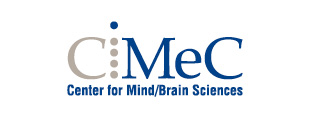Mission | Resources | Services offered | People | Contacts | Links | How to propose your project
Mission
The Magnetoencephalography Lab (MEG Lab) is operational at CIMEC since 2009 and provides cutting edge scientific and technical support to people who wants to use MEG for their own research.
The main facility at the MEG lab is a Vectorview 306 channel magnetoencephalograph (ElektaNeuromag, Helsinki) which records biomagnetic activity from the brain every millisecond (maximum sampling rate 5 kHz) with an overall sensitivity of 2.3 fT by means of 102 magnetometers and 204 planar axial gradiometers. The lab is also endowed with state-of-the-art MEG compatible peripheral devices (visual, auditory, tactile and electrical stimulation) and for monitoring EEG activity and eye gaze positions concurrently to the MEG recordings. In addition, the lab offers computational resources for the use of MEG customized data analysis software. Co-registration with MRI anatomical imaging is possible and made easy by means of the nearby MRI Lab scanner. This strongly improves the precision in localization of magnetic field sources in the participant brain.
Quality and reliability of the recorded MEG signal (and peripherally recorded data) is crucial for MEG research; furthermore, experimental and analysis techniques are under fast development in the international MEG community. Thus a mission of the MEG Lab is:
- keep the lab recording and analysis standards up-to-date, managing and implementing required technological and methodological updates;
- provide customized support in experimental design, data acquisition and analysis.
The MEG lab team is also pursuing research on on how functional information flows between distant brain areas may orchestrate cognition, with a particular focus on spatial and non-spatial attention in the visual and auditory domain. Other ongoing projects include functional connectivity and non-linear dynamics in resting state awake and sleep activity, as well as neuro-feedback and real time MEG at the source level.
The lab team is active in promoting the use of MEG and relevant best practices, as a keytool in neuroscience.
Further MEG-lab specific information can be found on our Wiki.
Resources
MEG lab experimentalareas:
- a two-layer Vacuum Schmelze AK-3 Magnetic Shieldedroom;
- recording area (MEG system console and experiment control);
- preparation room and changing rooms;
- seminar and analysis room.
Lab equipment:
- Elekta Neuromag VectorView 306 channels magnetoencephalograph;
- Head Position Indicator based continuous tracking of head position;
- 128 channels MEG compatible caps for simultaneous EEG recording;
- Polhemus Fastrak 3D head digitization system;
- MEG compatible SR-Research EyeLink 1000 Plus (2 KHz sampling rate);
- VPixx/ProPixx/ResponsePixx MEG compatible stimuli presentation and response collection system (< 1 ms timing precision);
- Pro Pixx led lamp projector (up to 1440 Hz greyscale – no jitter) with polarization filter and glasses for 3D;
- Photodiodes for high precision visual stimulus timing control;
- Elekta Panphonics SSH2 MEG compatible electrostatic speaker (60x60 cm);
- Braille Quaero Syspiezo stimulator system;
- Cambridge Research Systems Medi Googles visus correction system;
- MEG compatible TES system (NEUROCOMM DC stimulator plus);
- Two dedicated servers with Elekta Max Filter release 2.2 and a lot of standard & customized data analysis software.
Services offered
The MEG Lab provides following services:
- general service instrument usage assistance;
- training and consultation for experimental design and data analysis;
- technological and methodological research and development;
- systems optimization;
- promotion and dissemination (usermeetings, workshops etc.);
- general lab management.
Staff
- Davide Tabarelli,Technician in charge (MEG physicist)
- Gianpiero Monittola, Technician
Contacts
The MEG Lab is situated in via delle Regole 101, 38123 Mattarello (Tn)
Links
See the following Wiki link

